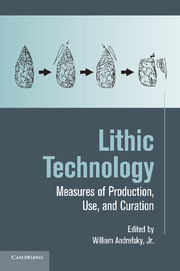Book contents
- Frontmatter
- Contents
- Preface and Acknowledgments
- List of Contributors
- PART I INTRODUCTION, BACKGROUND, AND REVIEW
- PART II PRODUCTION, REDUCTION, AND RETOUCH
- 3 Comparing and Synthesizing Unifacial Stone Tool Reduction Indices
- 4 Exploring Retouch on Bifaces: Unpacking Production, Resharpening, and Hammer Type
- 5 The Construction of Morphological Diversity: A Study of Mousterian Implement Retouching at Combe Grenal
- 6 Reduction and Retouch as Independent Measures of Intensity
- 7 Perforation with Stone Tools and Retouch Intensity: A Neolithic Case Study
- 8 Exploring the Dart and Arrow Dilemma: Retouch Indices as Functional Determinants
- PART III NEW PERSPECTIVES ON LITHIC RAW MATERIAL AND TECHNOLOGY
- PART IV EVOLUTIONARY APPROACHES TO LITHIC TECHNOLOGIES
- Index
- References
7 - Perforation with Stone Tools and Retouch Intensity: A Neolithic Case Study
Published online by Cambridge University Press: 22 August 2009
- Frontmatter
- Contents
- Preface and Acknowledgments
- List of Contributors
- PART I INTRODUCTION, BACKGROUND, AND REVIEW
- PART II PRODUCTION, REDUCTION, AND RETOUCH
- 3 Comparing and Synthesizing Unifacial Stone Tool Reduction Indices
- 4 Exploring Retouch on Bifaces: Unpacking Production, Resharpening, and Hammer Type
- 5 The Construction of Morphological Diversity: A Study of Mousterian Implement Retouching at Combe Grenal
- 6 Reduction and Retouch as Independent Measures of Intensity
- 7 Perforation with Stone Tools and Retouch Intensity: A Neolithic Case Study
- 8 Exploring the Dart and Arrow Dilemma: Retouch Indices as Functional Determinants
- PART III NEW PERSPECTIVES ON LITHIC RAW MATERIAL AND TECHNOLOGY
- PART IV EVOLUTIONARY APPROACHES TO LITHIC TECHNOLOGIES
- Index
- References
Summary
Abstract
A measure of retouch intensity, the EKCI, was devised based upon function and archaeological context. To arrive at the function of Pre-Pottery Neolithic A el-Khiam points from the Near East, controlled experiments were performed to determine the relative density of the contact material, which could affect use and retouch patterns. It was shown that el-Khiam points were likely used to pierce and scrape soft materials such as leather. The EKCI was then devised, measured, and tested. Experimental replication showed that the EKCI was an accurate measure of retouch intensity, and application of the EKCI to the lithic assemblage at Dhra' reaffirmed the EKCI's utility for analyzing PPNA archaeological assemblages. Although this curation index is effective for el-Khiam points, it may not be applicable to other hafted point types, which highlights the need for independently developed measures of retouch that account for the form, function, and context of the artifacts rather than attempting to generate universal measures of curation.
INTRODUCTION
Archaeological assemblages from the first farming villages in the Southern Levant have produced high-quality and large-quantity lithic data sets that Near Eastern archaeologists rely upon for interpreting the past. This vast resource of prehistoric knowledge has remained relatively untapped as a source of understanding individual decision-making in prehistoric lithic technology, especially from the perspective of artifact life histories and retouch intensity.
Information
- Type
- Chapter
- Information
- Lithic TechnologyMeasures of Production, Use and Curation, pp. 150 - 174Publisher: Cambridge University PressPrint publication year: 2008
References
Accessibility standard: Unknown
Why this information is here
This section outlines the accessibility features of this content - including support for screen readers, full keyboard navigation and high-contrast display options. This may not be relevant for you.Accessibility Information
- 12
- Cited by
